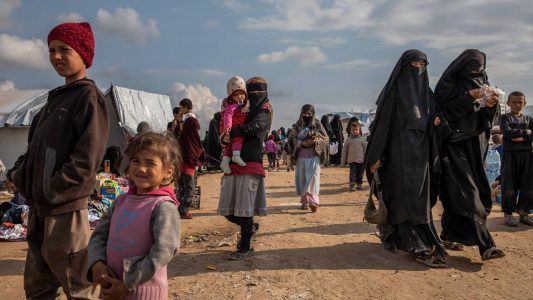
Coronavirus keeps the Bosnian families of Islamic State terrorists in Syrian camps
The repatriation of Bosnian women and children who lived in territory controlled by the so-called Islamic State and are now in camps in Syria has been postponed indefinitely because of the coronavirus pandemic.
Alema Dolamic’s sister has been living at the al-Roj displacement camp in Syria with her three children for the past three years, with no indication yet of when she can expect to be repatriated to Bosnia and Herzegovina.
Dolamic told BIRN that her sister keeps in touch regularly and has been told that no coronavirus infections have been registered at the camp so far, while a curfew has been put in place and the camp is disinfected every second day.
Even before the coronavirus outbreak, it was hard to get information from the Bosnian authorities about the return of families of ISIS fighters from Syrian camps, she said.
In December, 24 people were repatriated, including women and 12 children. Three suspected Islamist fighters were indicted and there are four more ongoing investigations. Other people have returned individually.
Dolamic expressed frustration at the continuing delay to the repatriation of the remaining Bosnians from the Middle East.
“Why can’t they deport around a hundred women and children from Syria?” she asked, suggesting that the problem lies in the fact that they are “labelled as terrorists”.
She said she was in touch with Bosnia’s State Investigation and Protection Agency and Intelligence-Security Agency, and earlier this month wrote to ask Bosnia’s Security Minister Fahrudin Radoncic “whether he is thinking about those people at all, particularly in the current situation”, but has so far received no response.
Safet Sinanovic, whose daughters and grandchildren are also in a Syrian camp, has not heard from the authorities either.
“It is as if these people are not our citizens. Nobody takes care of them, nobody says anything. Everything has stopped, and [the authorities] are keeping silent,” Sinanovic said.
He said he had no information about the coronavirus situation at the camp, adding that whenever he spoke to his daughters, they would just tell him they were all right.
“Maybe they would not even tell me about it. They said nothing about it, nothing about them being visited, all they said was that they were well,” he said.
Vlado Azinovic, a professor at the Faculty of Political Sciences in Sarajevo and an expert on extremism and terrorism, said that the pandemic inevitably delayed the repatriation of Bosnians who are still in the Middle East.
“The only thing we see at the moment is that the arrival of the remaining people from Syria has been postponed indefinitely,” he said.
The al-Roj and al-Hol camps, where Bosnian women and children are still living, are located in an area called the Autonomous Administration of North and East Syria, which is also known as NES, or Rojava.
Robin Fleming of the Rojava Information Centre said that because of a lack of resources and international aid in the area, the number of coronavirus infections is unknown.
“It is impossible to say how many positive cases there may or may not be in these camps or indeed in all of NES, due to the fact we have no testing facilities here,” Fleming told BIRN.
The International Crisis Group noted in a report published earlier this month that the situation in the Syrian and Iraqi camps for families of ISIS fighters was already poor before the pandemic, and that they are not equipped to deal with an outbreak of infection.
“As in all displacement camps in Iraq and Syria, people live without clean water, adequate food or reliable medical services – much less soap, hand sanitisers or protective gear,” the International Crisis Group said.
The International Committee of the Red Cross in Syria told BIRN that it is not responsible for testing people who live in the camps, only for looking after patients admitted to its field hospital.
“Our field hospital in al-Hol camp remains operational and our team has started to take all necessary and preventive measures to protect the patients, and also themselves, against any spread of the virus,” the ICRC said.
Source: Eurasia Review





